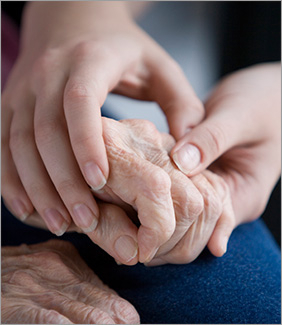Hospice in Halacha
The overriding Jewish value of prolonging life
Issue of July 3, 2009 / 11 Tammuz 5769
The recent article about an ordained Orthodox rabbi employed by a hospice (Where every day counts; June 26, 2009) was a welcome addition to these pages, but, as such articles often do due to space constraints, it glossed over the very complex issues involved in ‘end-of-life’ care, issues which have major implications for Orthodox Jews.
Whether a ‘terminal’ patient should ever enter hospice is itself a halachic question, a question of Jewish law, given the fact that much of hospice care in many facilities reflects a philosophy that is foreign to Judaism and is much more in sync with Christian thought.
For example, in hospice care the professionals often make sure to tell the patient he/she is ‘terminal,’ which in Jewish law can be problematic due to concerns about the mental anguish such a prognosis can cause.
In Jewish law we are taught to violate virtually all commandments, including the holy day of Yom Kippur, to provide ‘chayai sha’ah,’ extra moments of life, for a member of our community –– even if that person is comatose and without any ‘quality of life.’
In contrast, much of the current philosophy of hospice care revolves around notions about ‘quality of life’ and deriving existential ‘meaning’ from the ‘transition’ from life to death that are not only foreign to but also at odds with fundamental Jewish values and laws.
In addition, there are major financial considerations that shape the policies of many hospice programs. A wise philanthropist once told me, “When people speak about ideals, look for the money trail.” For-profit health programs are hiring people of various ethnic backgrounds in a variation of what in business is called ‘affinity marketing,’ i.e. using people who are of the same ethnic and religious background to draw in customers. Buyer beware!
Finally, there are important medical and halachic considerations in the care of a person considered to be ‘terminal.’ Good palliative care can often go hand in hand with therapies that can prolong the life of a person –– one of the highest values in Judaism, even if the life is prolonged by only a very short time.
For well over a year I have been honored to be helping to develop an end-of-life program being coordinated through the good offices of Agudath Israel that will, with G-d’s help, provide guidance to community members on these complex issues. Lawyers, doctors, and rabbis are working hard, under the direction of Rabbi Dovid Zwiebel and others, to provide immediate assistance to families faced with end-of-life issues.
With G-d’s help, families like the Golubchuk family of Canada, and the family of Motl Brody z”l of Borough Park, will no longer face uphill, costly, and lonely battles in their struggle to insure their religious values and beliefs are respected.
I would strongly counsel anyone faced with such issues to obtain an outside opinion from a recognized halachic authority, a scholar of Orthodox Jewish law, on any and all matters involving ‘end of life’ issues. This opinion can be prefaced by a review of the medical aspects of the case by an outside, independent medical professional without any ‘vested interest’ in the outcome or pleasing any particular healthcare system.
Those who wish to learn more about the end-of-life program or who have urgent situations can contact Agudath Israel of America at (212) 797-9000.
Those who wish to learn halachic issues involved in end-of-life care can contact the Jerusalem Center for Research on Medicine and Halacha (info@j-c-r.org or 011-972-2-5383558). Rabbi Yaakov Weiner shlita (y.weiner@j-c-r.org) is available for halachic issues and lectures around the world on such matters.
Locally, halachic authorities such as the renowned Rabbi Tzvi Flaum shlita can be consulted on a case-by-case basis (taryag@aol.com).
I would like to invite anyone interested in seriously learning about topics such as these in medical halacha to join us at the 12th annual International Yarchei Kallah on Medical Halacha in Jerusalem, August 5-11, 2009, or at any of myriad weekend Torah learning programs run by JCR around the United States.
Thanks again to The Jewish Star for bringing this issue to the attention of readers.
Dr. Leon Zacharowicz, a Far Rockaway resident, was the pro bono neurologist for the Golubchuk family in its legal battle, about which he has lectured at a conference on end of life care at Yeshiva University. Co-founder of an international yarchei kallah series on medical halacha (www.j-c-r.org), he is currently helping to coordinate a Winter 2009 New York seminar on medical ethics. He can be contacted at DrZach007 [at] aol. com.

 63.0°,
A Few Clouds and Breezy
63.0°,
A Few Clouds and Breezy 




